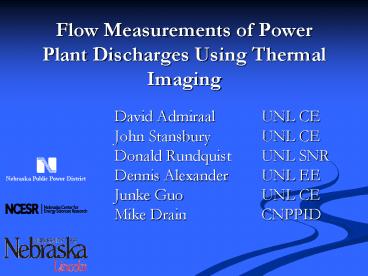Flow Measurements of Power Plant Discharges Using Thermal Imaging - PowerPoint PPT Presentation
Title:
Flow Measurements of Power Plant Discharges Using Thermal Imaging
Description:
... Measurements of Surface Velocity in a Flume. 70 cm Wide, 10 m Long Flume ... Laboratory Measurements of Surface Velocity in a Flume. Sample AVI of Seeded Flow ... – PowerPoint PPT presentation
Number of Views:52
Avg rating:3.0/5.0
Title: Flow Measurements of Power Plant Discharges Using Thermal Imaging
1
Flow Measurements of Power Plant Discharges Using
Thermal Imaging
- David Admiraal UNL CE
- John Stansbury UNL CE
- Donald Rundquist UNL SNR
- Dennis Alexander UNL EE
- Junke Guo UNL CE
- Mike Drain CNPPID
2
- Laboratory Measurements of Surface Velocity in a
Flume - 70 cm Wide, 10 m Long Flume
- Five Discharges
- Five Depths
- Four Seeding Rates
- Discharge Measured Independently with Weir
- Surface Temperature Measured with Thermal
Imaging Camera Mounted 2 m
Above Water Surface
3
Laboratory Measurements of Surface Velocity in a
Flume Sample AVI of Seeded Flow
4
Laboratory Experimental Results Flow Seeded with
Hot Water
Time 1 0.000 s
Time 2 0.264 s
5
Velocity Vector Determination By Tracking Thermal
Structures Two Algorithms for Seeded Flow
Contouring of Thermal Gradients
Unaltered Image
By Filtering or manipulating the thermal data we
can improve vector calculations (note improvement
in vector calculation for the image on the right)
6
- Discharge Calculation Results Using Surface
Velocities From Contoured Images Shown in
Previous Slide - Average Surface Velocity Measured with Thermal
Camera 0.309 ft/s - Depth-Averaged Velocity Calculated using Power
Law 0.271 ft/s - Discharge Computed using Depth-Averaged
Velocity and Flow Area 0.397 cfs - Discharge Measured with Weir 0.378 cfs
- Percent Difference between Calculated and
Measured Discharge 5
7
Laboratory Experimental Results Unseeded Flow
Time 1 0.000 s
Time 2 0.264 s
Note that images have been manipulated to show
that there is observable motion of structures.
Some of the structures have been circled in the
images.
8
Velocity Vector Determination By Tracking Thermal
Structures One Algorithm for Unseeded Flow
Thermal Gradients have been Contoured and Images
have been Filtered to Reduce Noise
Contouring and filtering vastly improves vector
results, but many of the vectors are still biased
to zero because of the correlation algorithm. We
are currently attempting a new algorithm called
Minimum Quadratic Difference (MQD)
9
- Summary
- It is feasible to accurately measure surface
velocity in seeded flows - It appears to be feasible to accurately measure
surface velocity in unseeded flows, but a more
robust algorithm will be important to reduce the
effects of noise - Choice of image interrogation algorithms and
filtering can improve velocity measurement
results
10
Sample of Aerial Measurements at Gerald Gentleman
Station Cooling Pond
11
Field Measurements of Surface Velocity in GGS
Cooling Pond Sample AVI































